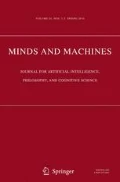Abstract
From an object-oriented perspective, this paper investigates the interdisciplinary aspects of problem representation as well the differences between representation of problems in the mind and that in the machine. By defining an object as a combination of a symbol-structure and its associated operations, it shows how the representation of problems can become related to control, which conducts the search in finding a solution. Different types of representation of problems in the machine are classified into four categories, and in a similar way four distinct models are distinguished for the representation of problems in the mind. The concept of layered hierarchies, as the main theme of the object-oriented paradigm, is used to examine the implications of problem representation in the mind for improving the representation of problems in the machine.
Similar content being viewed by others
References
Alsuwaiyel, W. (1999). Lecture notes series on computing. New Jersey: World Science Press.
Botvinnik, M. M. (1984). Computers in chess: Solving inexact search problems. New York: Springer.
Brown, D. E., & White, C. C. (1990). Operations research and artificial intelligence. New York: Kluwer.
Buro, M. (2002). Improving heuristic mini-max search by supervised learning. Artificial Intelligence, 134(1–2), 85–99. doi:10.1016/S0004-3702(01)00093-5.
Campbell, M., Hoane, A. J., & Hsu, F. H. (2002). Deep blue. Artificial Intelligence, 134(1–2), 57–83. doi:10.1016/S0004-3702(01)00129-1.
Chemero, A. (2007). Asking what’s inside the head: Neurophilosophy meets the extended mind. Minds and Machines, 17(3), 345–351. doi:10.1007/s11023-007-9073-3.
Dechter, R. (2003). Constraint processing. California: Morgan Kaufmann Publishers.
Dorndorf, U., Pesch, E., & Phan-Huy, T. (2000). A branch-and-bound algorithm for the resource-constrained project scheduling problem. Mathematical Methods of Operations Research, 52, 413–439. doi:10.1007/s001860000091.
Firebaugh, M. W. (1988). Artificial intelligence: A knowledge based approach. Boston: Boyd & Fraser Publishing Company.
Franklin, S. (2007). Walter J. Freeman, how brains make up their minds. Minds and Machines, 17(3), 353–356. doi:10.1007/s11023-007-9074-2.
Freuder, E. C. (1985). A sufficient condition for backtrack-bounded search. Journal of the ACM, 32(4), 755–761. doi:10.1145/4221.4225.
Hommad, A., & Kristian, J. (1989). Case-based planning: Viewing planning as memory task. Boston: Academic Press.
Kelin, M., & Methlie, L. B. (1990). Expert Systems: A decision support approach. London: Addison-Wesley.
Korb, K. B. (2004). Introduction: Machine learning as philosophy of science. Minds and Machines, 14(4), 433–440. doi:10.1023/B:MIND.0000045986.90956.7f.
Korf, R. E. (1987). Planning as search: A quantitive approach. Artificial Intelligence, 36, 201–218.
Legg, S., & Hutter, M. (2007). Universal intelligence: A definition of machine intelligence. Minds and Machines, 17(4), 391–444. doi:10.1007/s11023-007-9079-x.
Linsary, S. (1988). Practical application of expert systems. Massachusetts: Addison-Wesley.
Nilsson, N. J. (1980). Principles of artificial intelligence. San Francisco: Morgan Kaufmann.
Pearl, J. (1984). Heuristics: Intelligent search strategies for computer problem solving. Boston, MA, USA: Addison-Wesley Longman Publishing Co., Inc.
Schaeffer, J., & Herik, J. V. (2002). Games, computers, and artificial intelligence. Artificial Intelligence, 134, 1–8. doi:10.1016/S0004-3702(01)00165-5.
Shimansky, Y. P. (2004). The concept of a universal learning system as a basis for creating a general mathematical theory of learning. Minds and Machines, 14(4), 453–484. doi:10.1023/B:MIND.0000045988.12140.9f.
Simon, H. A. (1983). Why should machine learn: An artificial intelligence approach. California: Tioga- Palo.
Skyttner, L. (2001). General systems theory–ideas and applications. London: World Scientific.
Sowa, J. F. (2000). Knowledge representation: Logical, philosophical, and computational foundations. California: Brooks/Cole Publishing Co.
Wezel, W., & Jorna, R. J. (2001). Paradoxes in planning. Engineering Applications of Artificial Intelligence, 14(3), 269–286. doi:10.1016/S0952-1976(01)00009-4.
Zamani, R., & Lau, S. K. (2010). Embedding learning capability in Lagrangean relaxation: An application to the travelling salesman problem. European Journal of Operational Research, 201, 82–88.
Author information
Authors and Affiliations
Corresponding author
Rights and permissions
About this article
Cite this article
Zamani, R. An Object-Oriented View on Problem Representation as a Search-Efficiency Facet: Minds vs. Machines. Minds & Machines 20, 103–117 (2010). https://doi.org/10.1007/s11023-009-9160-8
Received:
Accepted:
Published:
Issue Date:
DOI: https://doi.org/10.1007/s11023-009-9160-8




